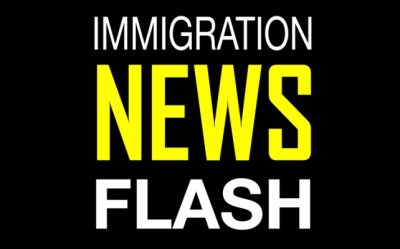Immigration Reform
The last time Congress updated our legal immigration system was November 1990, one month before the World Wide Web went online. We are long overdue for comprehensive immigration reform.
Through immigration reform, we can provide noncitizens with a system of justice that provides due process of law and a meaningful opportunity to be heard. Because it can be a contentious and wide-ranging issue, we aim to provide advocates with facts and work to move bipartisan solutions forward. Read more about topics like legalization for undocumented immigrants and border security below.
Immigration, Civil Rights and Labor Groups Join Legal Effort to Defend Immigration Action
Washington D.C. – Today, immigration, civil rights and labor groups joined the legal effort to defend President Obama’s recent executive action on immigration by filing an amicus “friend of the court” brief in the case, State of Texas vs. United States. In the days after the President’s… Read More

Cities in States Suing Over Executive Action Are Welcoming Immigrants
Half of the states have joined a lawsuit challenging President Obama’s executive action on immigration, the latest being Tennessee. Yet leadership of cities across the nation support the administration’s actions—even those within states whose governors and attorneys general are suing to stop it. What explains the disconnect?… Read More

Sheriff Arpaio’s Lawsuit Against Executive Action Faces Uphill Climb
On Monday, the U.S. District Court for the District of Columbia heard oral arguments in the first of two cases being brought against parts of President Obama’s recently announced executive action on immigration. Notorious Maricopa County Sheriff Joe Arpaio is seeking to stop the implementation of the DACA… Read More

U.S. District Court in D.C. Hears First Arguments Against Executive Action on Immigration
Washington D.C. – Today, the U.S. District Court for the District of Columbia heard oral arguments in the case brought against executive action by notorious Maricopa County Sheriff Joe Arpaio, who is seeking to enjoin the DACA and DAPA programs based on the increased burden on his law enforcement office… Read More

How Many Immigrants Could Be Eligible for Relief and Not Know It?
There are roughly 11 million unauthorized immigrants in the U.S, and while the president’s executive actions on immigration offer temporary deportation reprieves for millions, some unauthorized immigrants might be eligible for permanent immigration relief and not know it. That’s the finding of a recent report published in the Journal… Read More

How Many Immigrants Could Be Eligible for Relief and Not Know It?
There are roughly 11 million unauthorized immigrants in the U.S, and while the president’s executive actions on immigration offer temporary deportation reprieves for millions, some unauthorized immigrants might be eligible for permanent immigration relief and not know it. That’s the finding of a recent report published in the Journal… Read More

Washington Times Serves Up Some Anti-Immigrant Tea-Party Populism
Since 2010, the boundaries have been blurring among nativist organizations, Tea Party factions, and so-called “Patriot” groups as both their memberships and leaderships commingle. And so self-described nativists are now likely to spew forth rhetoric that is heavily imbued with the kind of shrill anti-government propaganda one might find… Read More

Congress-Passed Spending Bill Leaves DHS in Limbo
Following the close vote in the House last week, the Senate passed a spending bill 56-40 on Saturday to fund most of the government for the next year and avoid a government shutdown. Excluded from that full-year deal is the Department of Homeland Security, which is only funded until… Read More

The Economic Potential of Executive Action on Immigration
Mayors from cities across the country met in New York City earlier this week to discuss the implementation of President Obama’s immigration plan. These mayors support of executive action because they recognize the economic benefit to their cities as well as the role that executive action will… Read More

Final Immigration Hearings of 2014 Preview More Gridlock in 114th Congress
When the 113th Congress kicked off nearly two years ago, hopes were high that this would be the Congress to pass lasting immigration reform. “I think a comprehensive approach is long overdue, and I’m confident that the president, myself, others, can find the common ground to take care of this… Read More
Make a contribution
Make a direct impact on the lives of immigrants.
